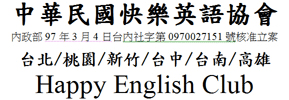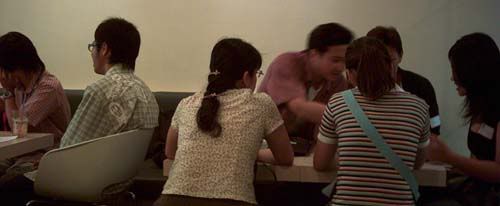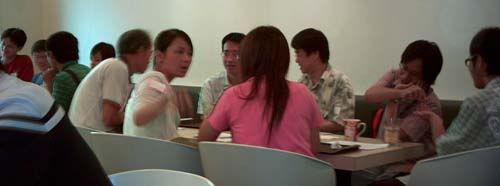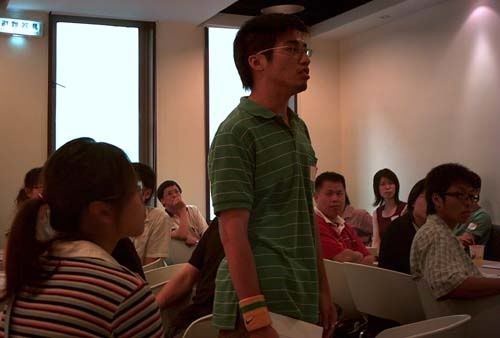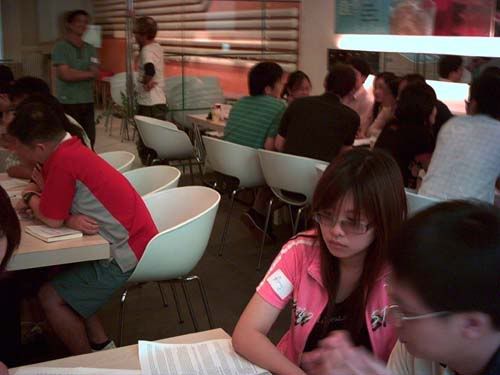網站 http://www.happyforum.org/ 歡迎超連結並轉寄網址
論壇 http://www.happyforum.org/happy/ 歡迎至論壇討論
Time:第 67 次例會,2006年8月5日(週六)下午2:30~5:00
Place: viewtopic.php?t=15
14:30~15:30 gossiping and chatting
15:30~15:45 Ice Breaker session
15:45~16:00 intermission
16:00~17:00 topic discussion
Host : Dirk Bremann
Assistant Host:
Topic:Cram schools
From Wikipedia, the free encyclopedia
Cram schools (also known as crammers) are specialized schools that train their students to meet particular goals, most commonly to pass the entrance examinations of high schools or universities. The English name is derived from the slang term "cramming," meaning to study hard or to study a large amount of material in a short period of time. Cram schools are more common in non-English speaking countries, and they go by various indigenous names, such as:
Education
Cram schools are usually privately owned. They are prevalent in East Asia, where education plays a greater part in adolescent life. In fact, there are so many cram schools in Japan, mainland China, Taiwan, Korea, Vietnam, and Hong Kong, that they have become a de facto parallel educational system, and high school students may need to attend cram schools after regular school to master certain important courses, like English, mathematics or natural sciences.
Cram schools usually specialize in a particular subject or subjects. Cram schools that prepare students for high school and university entrance examinations are also frequently specialized to particular schools, and the staff may have access to previous years' examinations. Special cram schools that prepare students who have failed their entrance examinations (known as ronin in colloquial Japanese) to take them the following year are also common. Such students may spend up to eighteen hours a day studying to retake their tests. Students who attend regular after-school cram schools may study four hours or more.
As the name suggests, the aim of a cram school is to impart as much information to its students as possible in the shortest period of time. The goal is to enable the students to "parrot," that is, to unthinkingly repeat, information that is deemed necessary for particular examinations. Cram schools are sometimes criticized, as indeed are the education systems in the countries in which they are prevalent, for the lack of training their students receive in critical thinking and analysis.
Cram schools in Taiwan
Taiwan's cram schools are called buxiban and are not necessarily cram schools in the traditional sense of cram. Almost any kind of extra curricular academic lesson could be termed buxiban regardless of whether it is really short-term or not.
Cram schools in India
Like in other Asian countries education plays a very great role in the lives of the young. And given the intense competition that young Indians experience because of the country's huge population, the need for a degree takes on a whole new perspective. Numerous cram schools—referred to as tutorials in India—have sprung up all over the nation. Like elsewhere here too these tutorials have become a parallel education system with the aim of getting their "clients" through various competitive exams. These exams are necessary to get into not only fields like engineering, medicine and law but also into India's civil services.
Cram schools in Korea
It is common for Korean school-children to attend one or more institutes after their elementary school-day is finished. Some types of institutes include math, science, art, and English. English-language institutes are particularly popular.
Many native English-speakers are hired to teach at English-language institutes in Korea, referred to as English hagwons. The requirements for such a teaching position include a 4-year university degree, citizenship in an English-speaking country, and the ability to sign a contract for one year. In return, the institute often provides the instructor with round-trip airfare from his or her country of origin and a rent-free apartment for the duration of the instructor's contract.
Because of the importance of the university entrance examination in determining one's career prospects, students are under intense pressure to study long hours. The high school years, especially, are a time when students have little chance to do much except study. The Korean saying "Sleep five hours and fail, sleep four hours and pass" is taken seriously; for three years students typically begin school at 6 a.m. and finish at midnight; some students finish at 10 p.m. and go to hagwons until midnight or 1 a.m.. Students can forgo the 6 p.m. to midnight classes and self-study sessions but only with permission from both their parents and their homeroom teacher, and few bother to ask. The schedule lasts seven days a week and is rigorous even during periods of nominal vacation. It is not uncommon during exam periods to see students sleeping during class from exhaustion. Students are encouraged to conceive of themselves as being in fierce competition with their friends and peers.
Corporal punishment is the most common method of punishment, and ranges from light to severe. Students are punished not only for actual infractions of school rules, but also for giving incorrect answers during class or receiving low marks on exams. Common punishments include being beaten on the palms, calves, and buttocks and being put into humiliating or physically stressful positions, such as kneeling on a desk while holding a chair above the head. Though rare, students are sometimes severely injured by their teachers. Because teachers are expected to instill moral virtue, students can be punished even for behavior outside of school; for example if they are seen drinking or riding on a motorcycle. In 2003 it was reported that roughly 75% of elementary schools and 80% of middle and high schools employ corporal punishment; a 1999 poll found that almost 75% of parents support it. The official government position is that corporal punishment is prohibited; little if anything, however, is done to enforce the ban.
Students are required to wear uniforms, and the vast majority of schools also strictly regulate the length of students' hair. If it is found to be too long a teacher may cut it on the spot. Students in 2005 began organizing a campaign, called "No Cut", to protest this rule. Since the campaign began the Ministry of Education directed schools not to regulate hair length but, as with corporal punishment, does not check schools for compliance. Many schools in larger cities allow students more freedom about their hair length, as long as it is neat or tied (for girls). Many accessories are still not allowed.
Korean high school students suffer from high rates of depression and suicide; suicide rates spike around times of major exams. In 2005 students gathered in Seoul for a candlelight vigil in memory of friends who had committed suicide and to protest for shorter school hours and an end to the haircut policy. A significant number of them wore masks and asked reporters not to take photographs out of fear of being punished by their teachers; many schools warned their students not to attend.
Cram schools in China
Cram schools are popular in mainland China due to the importance of standardized exams, such as:
High school entrance exam (after junior high, at 9th year of school).
The National College Entrance Examination, mandatory for college admission.
English language exams. Passing the College English Test (CET) band 4 and 6 is sometimes a prerequisite for bachelor's degree, and the certificates are important in job search. The TOEFL and GRE tests from ETS are required for studying abroad in English-speaking countries. The most successful cram school in English is New Oriental, which quite resembles Kaplan in the US (see below).
Entrance exams to domestic graduate program. Over recent years the competition has been intensified, partially because many new college graduates fail to find satisfactory jobs and seek post-graduate education instead.
Cram schools in Turkey
The "dersane" system is the Turkish counterpart of cram schools. Students, typically in week-ends (in many instances, also after the school hours, especially in the last year), are drilled on various aspects of OSS, the unified "Student Selection Exam".
A category of high school called "Fen Lisesi" (Sciences High School) is also widely considered as cram schools in Turkey. In the beginning, these schools had been found to promote scientific education particularily in the primary sciences like Physics, Chemistry, Biology and Mathematics. However the unified university entrance test exam system (OSS) structure transformed these school into intense test tutoring centers where students are trained for 4 years on taking the OSS test. Widely criticized in Turkey for inability to provide a well-rounded universal education nor the primary sciences to students, the "Fen Lisesi" system have produced consistently the best OSS test scorers years after years, especially in Sciences and Mathematics weighted point groups.
Cram schools in the United States
The phrase "cram school" is considered pejorative in the United States, so similar businesses are called "tutoring services" or "test preparation centers." Some well-known businesses of this type are Kumon, Barron's, Kaplan, Peterson's and the Sylvan Learning Center franchises of Educate, Incorporated. In Europe, a similar brand is Schülerhilfe. (The hosts comment: This is just an institution to help weak students do their homework and prepare them for class tests, like tutoring)
Questions:
1. Are cram schools really so important for the educational system of a country?
2. Did you go/are you still going to a cram school? What is your feeling about the “educational output”?
3. Why are the regular schools not able to provide students with a good test preparation and other necessary particular targets required?
4. In Germany you go to school from Mo – Fri from 8 am to 2 pm, sometimes longer and sometimes on Sat. But sometimes less than that. You spend more time socializing and having fun with friends. That sounds good and it’s just 1/3 of the time you spend studying Do you think school life is better or maybe just faster and harder?
5. Are cram schools a must to succeed in the Asian world? Or are they just a fashion and in the end nothing worth?
6. High scores are very important here! Why is paper more important than the person?
參與例會,請自行列印當週的討論文章並帶至現場,圖示如下:

http://www.happyforum.org/
台北,每週六 (2005年6月起)
Taipei, Saturday, Weekly
from June, 2005
Place:
viewtopic.php?t=15

高雄,每月最後一個週日 (2007年4月起)
Kaohsiung, Final Sunday, Monthly
from April, 2007
Place:
viewtopic.php?t=15



